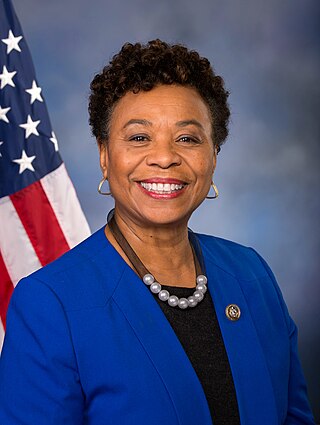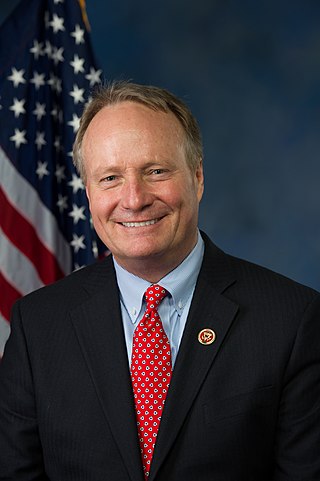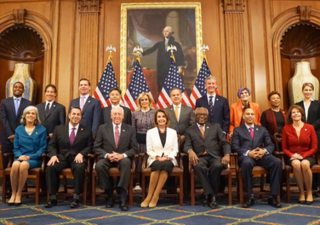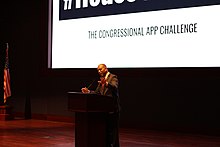
Barbara Jean Lee is an American politician and social worker who has served as a U.S. representative from California since 1998. A member of the Democratic Party, Lee represents California's 12th congressional district, which is based in Oakland and covers most of the northern part of Alameda County. According to the Cook Partisan Voting Index, it is one of the nation's most Democratic districts, with a rating of D+40.

The Congressional Black Caucus (CBC) is a caucus made up of African-American members of the United States Congress. Representative Steven Horsford from Nevada is the caucus chairperson, having succeeded Joyce Beatty from Ohio in 2023.

The U.S. House Committee on the Judiciary, also called the House Judiciary Committee, is a standing committee of the United States House of Representatives. It is charged with overseeing the administration of justice within the federal courts, federal administrative agencies, and federal law enforcement entities. The Judiciary Committee is often involved in the impeachment process against federal officials. Because of the legal nature of its oversight, committee members usually have a legal background, but this is not required.

Timothy Lee Walberg is an American serving as the U.S. representative from Michigan's 5th congressional district since 2023. A member of the Republican Party, he previously represented the 7th district from 2007 to 2009 and from 2011 to 2023. As the longest tenured member from Michigan, Walberg is the current Dean of its delegation to the U.S. House of Representatives.

The United States Association of Former Members of Congress, or FMC, is a non-partisan, non-profit organization of over 800 former Members of the United States Congress.

David Patrick Joyce is an American politician and attorney currently serving in the United States House of Representatives for Ohio's 14th congressional district since 2013. A member of the Republican Party, Joyce was previously the prosecutor of Geauga County, Ohio. He chairs the Republican Governance Group.

Mark Allan Takano is an American politician and academic who has served in the United States House of Representatives since 2013, representing California's 41st congressional district from 2013 to 2023, and the state's 39th congressional district since 2023. A member of the Democratic Party, Takano became the first gay person of Asian descent in Congress upon taking office.

Eric Michael Swalwell is an American lawyer and politician serving as the U.S. representative for California's 14th congressional district since 2023. His district, numbered as the 15th district from 2013 to 2023, covers most of eastern Alameda County and part of central Contra Costa County. He is a member of the Democratic Party.

Pramila Jayapal is an American politician serving as the U.S. representative from Washington's 7th congressional district since 2017. A member of the Democratic Party, she represents most of Seattle, as well as some suburban areas of King County. Jayapal represented the 37th legislative district in the Washington State Senate from 2015 to 2017. She is the first Indian-American woman to serve in the U.S. House of Representatives. The district's first female member of Congress, she is also the first Asian American to represent Washington at the federal level.

The 118th United States Congress is the current meeting of the legislative branch of the United States federal government, composed of the United States Senate and the United States House of Representatives. It convened in Washington, D.C., on January 3, 2023, and will end on January 3, 2025, during the final two years of President Joe Biden's initial term.

The Congressional Cannabis Caucus is a registered caucus in the United States Congress, formed in 2017 during the 115th session. The bipartisan caucus was founded by Republicans Dana Rohrabacher and Don Young and Democrats Earl Blumenauer and Jared Polis. The Congressional Cannabis Caucus seeks to harmonize federal laws that conflict with various state laws that permit medical and recreational cannabis.

The 2020 United States House of Representatives elections in Ohio were held on November 3, 2020, to elect the 16 U.S. representatives from the state of Ohio, one from each of the state's 16 congressional districts. The elections coincided with the 2020 U.S. presidential election, as well as other elections to the House of Representatives, elections to the United States Senate and various state and local elections. Primaries were held on April 28, 2020.

A leadership election was held by the United States House of Representatives Democratic Caucus before the beginning of the 116th United States Congress on January 3, 2019. The election determined who will be nominated by the caucus for the speakership election as well as who would occupy other leadership positions within the House Democratic Caucus. The following positions were nominated or elected on November 29: Speaker of the U.S. House of Representatives, House Majority Leader, House Majority Whip, House Assistant Majority Leader, Democratic Caucus Chair, and Democratic Caucus Vice Chair. The Democratic Congressional Campaign Committee Chair, the Policy and Communications Committee's Chair and its three Co-Chairs, Junior Caucus Representative and Freshman Class Representative were elected the next day, and a third co-chair was added to the Steering and Policy Committee by the Leader.

The 2020 United States House of Representatives elections in Virginia was held on November 3, 2020, to elect the 11 U.S. representatives from the state of Virginia, one from each of the state's 11 congressional districts. The elections coincided with the 2020 U.S. presidential election, as well as other elections to the House of Representatives, elections to the United States Senate and various state and local elections.

The 2020 United States House of Representatives elections in California were held on November 3, 2020, to elect the 53 U.S. representatives from the state of California, one from each of the state's 53 congressional districts. The elections coincided with the 2020 U.S. presidential election, as well as other elections to the United States House of Representatives, elections to the United States Senate, and various state and local elections.

The 2020 United States House of Representatives elections in Michigan were held on November 3, 2020, to elect the 14 U.S. representatives from the state of Michigan, one from each of the state's 14 congressional districts. The elections coincided with the 2020 U.S. presidential election, as well as other elections to the House of Representatives, elections to the United States Senate and various state and local elections. Party primaries were held on August 4, 2020. The Michigan delegation prior to the election consisted of seven Democrats, six Republicans and one Libertarian. Unless otherwise indicated, the Cook Political Report rated the races as safe for the party of the incumbents.

The 2020 United States House of Representatives elections in Minnesota was held on November 3, 2020, to elect the eight U.S. representatives from the state of Minnesota, one from each of its congressional districts. Primary elections were held in six districts on August 11. The elections coincided with the 2020 United States presidential election as well as other elections to the House of Representatives, elections to the United States Senate and other state and local elections.

The 2022 United States House of Representatives elections in California were held on November 8, 2022, to elect representatives for the 52 seats in California. This marked the first time in the state's history where it lost a seat.

The 2022 United States House of Representatives elections in Michigan were held on November 8, 2022, to elect representatives for the thirteen seats in Michigan. The deadline for candidates to file for the August 2 primary was April 19. The congressional makeup prior to the election was seven Democrats and seven Republicans. However, after the 2020 census, Michigan lost one congressional seat. Democrats won a majority of seats in the state for the first time since 2008. This can be partly attributed to the decrease in the number of districts, which resulted in two Republican incumbents – Bill Huizenga and Fred Upton – in the new 4th district. Redistricting also played a part in shifting partisan lean of the districts which favored the Democrats overall, including in the 3rd district, which Democrats were able to flip with a margin of victory of 13 points. That was made possible by a non-partisan citizens' commission drawing the new political boundaries instead of the Michigan legislature after a 2018 ballot proposal was approved.
The Congressional Armenian Caucus (CAC) is an organization of over 100 members of the United States Congress. The Caucus is dedicated to keeping members of Congress engaged on Armenia-related issues as well as strengthening and maintaining the US-Armenia relationship. In particular, the Congressional Armenian Caucus aims to increase US aid to Armenia and Artsakh, recognise the Armenian genocide and to recognise the independence of Artsakh. The CAC was founded in 1995. Although the majority of the members are from the Democratic Party, there are also members from the Republican party including Co-Chairs Gus Bilirakis and David Valadao.






















